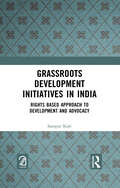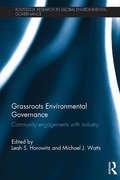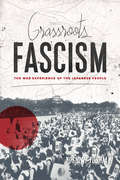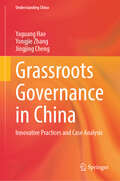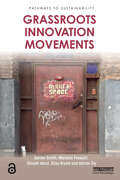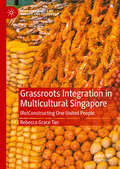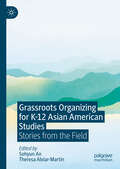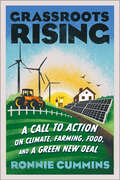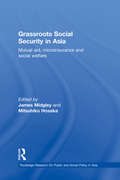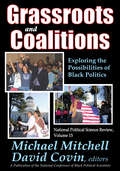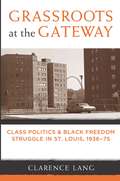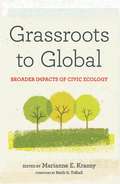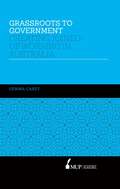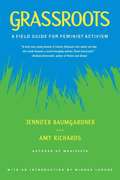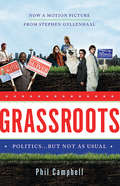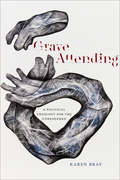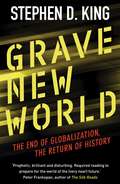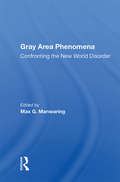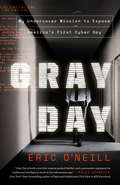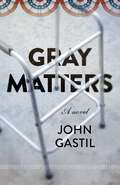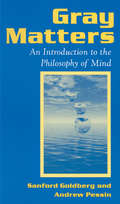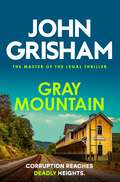- Table View
- List View
Grassroots Development Initiatives in India: Rights Based Approach to Development and Advocacy
by Sampat KaleThis book examines how the voluntary organisations engaged with development programmes work with the approach of conscientisation to empower Adivasis. Their work has been instrumental in making government machinery pro-poor by implementing development programmes with greater transparency and accountability. Conscientisation of Adivasis by voluntary organisations through their educative role has resulted in the advancement of their lives and the emergence of autonomous leadership. The study concludes that the ideological base of the founders of the organisations made the Adivasis independent and self-supportive for their development from their earlier status of servitude through initiating and accomplishing the task of conscientisation. This title is co-published with Aakar Books. Print editions not for sale in South Asia (India, Sri Lanka, Nepal, Bangladesh, Pakistan and Bhutan)
Grassroots Environmental Governance: Community engagements with industry (Routledge Research in Global Environmental Governance)
by Michael J. Watts Leah S. HorowitzGrassroots movements can pose serious challenges to both governments and corporations. However, grassroots actors possess a variety of motivations, and their visions of development may evolve in complex ways. Meanwhile, their relative powerlessness obliges them to forge an array of shifting alliances and to devise a range of adaptive strategies. Grassroots Environmental Governance presents a compilation of in-depth ethnographic case studies, based on original research. Each of the chapters focuses specifically on grassroots engagements with the agents of various forms of industrial development. The book is geographically diverse, including analyses of groups based in both the global North and South, and represents a range of disciplinary perspectives. This allows the collection to explore themes that cross-cut specific localities and disciplinary boundaries, and thus to generate important theoretical insights into the complexities of grassroots engagements with industry. This volume will be of great interest to scholars of environmental activism, environmental governance, and environmental studies in general.
Grassroots Fascism: The War Experience of the Japanese People
by Ethan Mark Yoshimi YoshiakiGrassroots Fascism profiles the Asia Pacific War (1941--1945) -- the most important though least understood experience of Japan's modern history -- through the lens of ordinary Japanese life. Moving deftly from the struggles of the home front to the occupied territories to the ravages of the front line, the book offers rare insight into popular experience from the war's troubled beginnings through Japan's disastrous defeat in 1945 and the new beginning it heralded.Yoshimi Yoshiaki mobilizes personal diaries, memoirs, and government documents to portray the ambivalent position of ordinary Japanese as both wartime victims and active participants. He also provides equally penetrating accounts of the war experience of Japan's imperial subjects, including Koreans and Taiwanese. This book challenges the idea that the Japanese operated as a passive, homogenous mass during the war -- a mere conduit for a military--imperial ideology imposed upon them by the political elite. Viewed from the bottom up, wartime Japan unfolds as a complex modern mass society, with a corresponding variety of popular roles and agendas. In chronicling the diversity of the Japanese social experience, Yoshimi's account elevates our understanding of Japan's war and "Japanese Fascism," and in its relation of World War II to the evolution -- and destruction -- of empire, it makes a fresh contribution to the global history of the war. Ethan Mark's translation supplements the Japanese original with explanatory annotations and an in-depth analytical introduction, drawing on personal interviews to situate the work within Japanese studies and global history.
Grassroots Fascism: The War Experience of the Japanese People (Weatherhead Books on Asia)
by Yoshiaki YoshimiGrassroots Fascism profiles the Asia Pacific War (1937–1945)—the most important though least understood experience of Japan's modern history—through the lens of ordinary Japanese life. Moving deftly from the struggles of the home front to the occupied territories to the ravages of the front line, the book offers rare insights into popular experiences from the war's troubled beginnings through Japan's disastrous defeat in 1945 and the new beginning it heralded.Yoshimi Yoshiaki mobilizes diaries, letters, memoirs, and government documents to portray the ambivalent position of ordinary Japanese as both wartime victims and active participants. He also provides penetrating accounts of the war experiences of Japan's minorities and imperial subjects, including Koreans and Taiwanese. His book challenges the idea that the Japanese people operated as a mere conduit for the military during the war, passively accepting an imperial ideology imposed upon them by the political elite. Viewed from the bottom up, wartime Japan unfolds as a complex modern mass society, with a corresponding variety of popular roles and agendas.In chronicling the diversity of wartime Japanese social experience, Yoshimi's account elevates our understanding of "Japanese Fascism." In its relation of World War II to the evolution—and destruction—of empire, it makes a fresh contribution to the global history of the war. Ethan Mark's translation supplements the Japanese original with explanatory notes and an in-depth introduction that situates the work within Japanese studies and global history.
Grassroots Governance in China: Innovative Practices and Case Analysis (Understanding China)
by Yongjie Zhang Yaguang Hao Jingjing ChengThis book provides an in-depth empirical analysis of six core strategies in China's grassroots social governance. These strategies represent the essence of grassroots social governance in China, spanning community management, public services, conflict mediation, and mass participation. They embody the innovative spirit and pragmatic approach of the Chinese government in social governance. By empirically analyzing these strategies, the book unveils the unique advantages of China's grassroots social governance and its significance for global governance. It is an indispensable textbook, especially for courses on Chinese politics, social governance in China, and East Asian politics.
Grassroots Innovation Movements (Pathways to Sustainability)
by Adrian Smith Mariano Fressoli Dinesh Abrol Elisa Arond Adrian ElyInnovation is increasingly invoked by policy elites and business leaders as vital for tackling global challenges like sustainable development. Often overlooked, however, is the fact that networks of community groups, activists, and researchers have been innovating grassroots solutions for social justice and environmental sustainability for decades. Unencumbered by disciplinary boundaries, policy silos, or institutional logics, these ‘grassroots innovation movements’ identify issues and questions neglected by formal science, technology and innovation organizations. Grassroots solutions arise in unconventional settings through unusual combinations of people, ideas and tools. This book examines six diverse grassroots innovation movements in India, South America and Europe, situating them in their particular dynamic historical contexts. Analysis explains why each movement frames innovation and development differently, resulting in a variety of strategies. The book explores the spaces where each of these movements have grown, or attempted to do so. It critically examines the pathways they have developed for grassroots innovation and the challenges and limitations confronting their approaches. With mounting pressure for social justice in an increasingly unequal world, policy makers are exploring how to foster more inclusive innovation. In this context grassroots experiences take on added significance. This book provides timely and relevant ideas, analysis and recommendations for activists, policy-makers, students and scholars interested in encounters between innovation, development and social movements.
Grassroots Integration in Multicultural Singapore: (Re)Constructing One United People (Palgrave Politics of Identity and Citizenship Series)
by Rebecca Grace TanThis book studies the role that grassroots volunteers play in the integration and naturalization process in Singapore. With increasing migration, the topics of migrant integration and belonging are of perennial academic and public interest. However, much of the existing literature on the subject is largely focused on European and North American cases. By focusing on the single case of Singapore, this project provides a story of how a city-state grapples with the issue of managing increasing cultural diversity while seeking to maintain a cohesive identity. As a city, Singapore has many ubiquitous features of other urban centres for migration, such as a rapidly diversifying population and an economy that is heavily reliant on foreign labour. At the same time, being a city-state means that the demographic and cultural changes experienced in Singapore also coincide with questions of national belonging and membership in the nation-state, in contrast to larger countries with rural-urban divides or more decentralized systems of migration management and integration. Examining this simultaneously typical yet unique case study means that this project is able to examine the processes where state and society have managed migration and cultural diversity at the level of the nation-state. For example, this project discusses how Singapore’s policy of multiracialism complements nation-building efforts, adding to existing public and academic debate about whether societies can concurrently embrace cultural difference yet maintain a cohesive national identity.
Grassroots Organizing for K-12 Asian American Studies: Stories from the Field
by Sohyun An Theresa Alviar-MartinThis edited book captures Asian American grassroot organizing in Georgia through counterstorytelling. Rooted in Critical Race Theory and traditions of narrative inquiry, counterstorytelling in educational research seeks to challenge dominant narratives by centering marginalized communities’ experiences and perspectives as sources of valuable knowledge. By employing AsianCrit, global citizenship education, human rights, and liberatory postcolonial education as theoretical lenses, the editors of this book interrupt essentialized portrayals of Asian Americans by featuring stories of Asian American students, parents, and educators who are fighting for Asian American Studies and Ethnic Studies in K-12 schools in Georgia. Their stories capture common as well as divergent experiences of being Asian American in the South and illuminate possibilities, challenges, and complexity of grassroots organizing for Asian American studies and ethnic studies in the South.
Grassroots Rising: A Call to Action on Climate, Farming, Food, and a Green New Deal
by Ronnie Cummins&“This is a book that should be in the hands of every activist working on food and farming and climate change.&”—Vandana ShivaA practical, shovel-ready plan for anyone wondering what they can do to help address the global climate crisisGrassroots Rising is a passionate call to action for the global body politic, providing practical solutions for how to survive—and thrive—in catastrophic times. Author Ronnie Cummins, founder and director of the Organic Consumers Association, aims to educate and inspire citizens worldwide to organize and become active participants in preventing ecological collapse.This book offers a blueprint for building and supercharging a grassroots Regeneration Movement based on:• Consumer activism• Farmer innovation• Political change• Regenerative financeCummins asserts that the solution lies right beneath our feet and at the end of our forks through the transformation of our broken food system. Using regenerative agriculture practices that restore our agricultural and grazing lands, we can sequester massive amounts of carbon in the soil. Coupled with an aggressive transition toward renewables, he argues that we have the power to not only mitigate and slow down climate change, but actually reverse global warming by strengthening our infrastructure.Grassroots Rising shows that a properly organized and executed Regeneration Revolution can indeed offer realistic climate solutions while also meeting our everyday needs.&“This is a &‘good news&’ instructional book for Regeneration, a plan of action for the United States and the world to transition to climate stability, peace, justice, health, prosperity, cooperation, and participatory democracy.&”—Ronnie Cummins
Grassroots Social Security in Asia: Mutual Aid, Microinsurance and Social Welfare (Routledge Research On Public and Social Policy in Asia)
by James Midgley Mitsuhiko HosakaGrassroots Social Security in Asia investigates the role of mutual associations in providing income protection to low-income people in Asia and in particular the region's developing countries. Historically, these associations have consisted of small groups of people with common interests who save regularly to support, maintain and supplement their incomes. Members make regular contributions to a communal fund which is used to provide income protection when they experience financial hardship. This book is the first to comprehensively document the activities of mutual associations and their microinsurance programs in Asia where these programs are especially well developed. It provides a number of important case studies that provide detailed information about mutual associations in different parts of the region, covering South Asia, Sri Lanka, Thailand, Mongolia, Indonesia and the Philippines. The case studies offer important insights into the potential of mutual associations to offer effective income protection and how their activities can contribute to the formulation of comprehensive and effective grassroots social security strategies in the developing world that make a tangible contribution to the goal of poverty eradication and the improvement of standards of living. This book will be of interest to policy makers, academics and students in the fields of Asian studies, Social security studies and development studies.
Grassroots and Coalitions: Exploring the Possibilities of Black Politics (National Political Science Review Ser.)
by Michael Mitchell David CovinThe main focus of this volume is an exploration of the patterns of competition for political power at the state and local levels in American politics. This volume looks at institutionalized patterns of black political power as they have evolved in the aftermath of the civil rights movement in the 1960s.The editors argue that enough time has elapsed to warrant a new look at the circumstances in which black politics in America has played out. Chapters include an examination of the ability of black candidates to win statewide elections with crucial white support; an analysis of the impact of local political organizations in enhancing the chances of black candidates in winning local races; a look at the messages of black pastors regarding solidarity with the Latino community; and an investigation of the extent of the differences in the political participatory styles of poor blacks and poor whites.The editors note that changes have taken place as black American politics has confronted new complexities. A works-in-progress section explains how theories of racial violence can be used to analyze racial incidents in the United States. Other essays include reflections on blacks in Brazil and in urban American politics.
Grassroots at the Gateway
by Clarence Lang"This is a theoretically sophisticated and thoroughly documented historical case study of the movements for African American liberation in St. Louis. Through detailed analysis of black working class mobilization from the depression years to the advent of Black Power, award-winning historian Clarence Lang describes how the advances made in earlier decades were undermined by a black middle class agenda that focused on the narrow aims of black capitalists and politicians. The book is a major contribution to our understanding of the black working class insurgency that underpinned the civil rights and Black Power campaigns of the twentieth century. " ---V. P. Franklin, University of California, Riverside "A major work of scholarship that will transform historical understanding of the pivotal role that class politics played in both civil rights and Black Power activism in the United States. Clarence Lang's insightful, engagingly written, and well-researched study will prove indispensable to scholars and students of postwar American history. " ---Peniel Joseph, Brandeis University Breaking new ground in the field of Black Freedom Studies,Grassroots at the Gatewayreveals how urban black working-class communities, cultures, and institutions propelled the major African American social movements in the period between the Great Depression and the end of the Great Society. Using the city of St. Louis in the border state of Missouri as a case study, author Clarence Lang undermines the notion that a unified "black community" engaged in the push for equality, justice, and respect. Instead, black social movements of the working class were distinct from---and at times in conflict with---those of the middle class. This richly researched book delves into African American oral histories, records of activist individuals and organizations, archives of the black advocacy press, and even the records of the St. Louis' economic power brokers whom local black freedom fighters challenged. Grassroots at the Gatewaycharts the development of this race-class divide, offering an uncommon reading of not only the civil rights movement but also the emergence and consolidation of a black working class. Clarence Lang is Assistant Professor in African American Studies and History at the University of Illinois at Urbana-Champaign. Photo courtesy Western Historical Manuscript Collection, University of Missouri, St. Louis
Grassroots for Hire
by Edward T. WalkerAlthough 'grassroots' conjures up images of independent citizen organizing, much mass participation today is sponsored by elite consultants working for corporations and powerful interest groups. This book pulls back the curtain to reveal a lucrative industry of consulting firms that incentivize public activism as a marketable service. Edward Walker illustrates how, spurred by the post-sixties advocacy explosion and rising business political engagement, elite consultants have deployed new technologies to commercialize mass participation. Using evidence from interviews, surveys and public records, Grassroots for Hire paints a detailed portrait of these consultants and their clients. Today, Fortune 500 firms hire them to counter-mobilize against regulation, protest or controversy. Ironically, some advocacy groups now outsource organizing to them. Walker also finds that consultants are reshaping both participation and policymaking, but unethical 'astroturf' strategies are often ineffective. This pathbreaking book calls for a rethinking of interactions between corporations, advocacy groups, and elites in politics.
Grassroots to Global: Broader Impacts of Civic Ecology
by David MaddoxAddressing participatory, transdisciplinary approaches to local stewardship of the environment, Grassroots to Global features scholars and stewards exploring the broad impacts of civic engagement with the environment.Chapters focus on questions that include: How might faith-based institutions in Chicago expand the work of church-community gardens? How do volunteer "nature cleaners" in Tehran attempt to change Iranian social norms? How does an international community in Baltimore engage local people in nature restoration while fostering social equity? How does a child in an impoverished coal mining region become a local and national leader in abandoned mine restoration? And can a loose coalition that transforms blighted areas in Indian cities into pocket parks become a social movement? From the findings of the authors’ diverse case studies, editor Marianne Krasny provides a way to help readers understand the greater implications of civic ecology practices through the lens of multiple disciplines.Contributors:Aniruddha Abhyankar, Martha Chaves, Louise Chawla, Dennis Chestnut, Nancy Chikaraishi, Zahra Golshani, Lance Gunderson, Keith E. Hedges, Robert E. Hughes, Rebecca Jordan, Karim-Aly Kassam, Laurel Kearns, Marianne E. Krasny, Veronica Kyle, David Maddox, Mila Kellen Marshall, Elizabeth Whiting Pierce, Rosalba Lopez Ramirez, Michael Sarbanes, Philip Silva, Traci Sooter, Erika S. Svendsen, Keith G. Tidball, Arjen E. J. Wals, Rebecca Salminen Witt, Jill Wrigley
Grassroots to Government: Creating joined-up working in Australia
by Gemma CareyJoined-up government has captured the imaginations of public administrators for many decades. It offers great promise for tackling the complex, or 'wicked', policy problems that concern the governments of industrialised countries. Despite ongoing interest, there remains an absence of core methods and principles to make joined-up government work in practice. Increasingly, public policy scholars are calling for 'evidence-based' joined-up government. However, this evidence is currently in its infancy.In addition to an overview of current debates, Grassroots to Government comprehensively explains the state of evidence in joined-up government, accompanied by an in-depth case study of the experiences of a national joined-up initiative-the Australian Social Inclusion Agenda. In doing so, it offers both a breadth and depth of knowledge on joined-up government. Grassroots to Government is essential reading for anyone interested in designing, implementing and evaluating joined-up and whole-of-government initiatives, including: public service professionals, academics, community sector practitioners, and advanced level students in public policy, social policy and public administration.
Grassroots: A Field Guide for Feminist Activism
by Jennifer Baumgardner Amy RichardsFrom the authors of Manifesta, an activism handbook that illustrates how to truly make the personal political. Grassroots is an activism handbook for social justice. Aimed at everyone from students to professionals, stay-at-home moms to artists, Grassroots answers the perennial question: What can I do? Whether you are concerned about the environment, human rights violations in Tibet, campus sexual assault policies, sweatshop labor, gay marriage, or the ongoing repercussions from 9-11, Jennifer Baumgardner and Amy Richards believe that we all have something to offer in the fight against injustice. Based on the authors' own experiences, and the stories of both the large number of activists they work with as well as the countless everyday people they have encountered over the years, Grassroots encourages people to move beyond the "generic three" (check writing, calling congresspeople, and volunteering) and make a difference with clear guidelines and models for activism. The authors draw heavily on individual stories as examples, inspiring readers to recognize the tools right in front of them--be it the office copier or the family living room--in order to make change. Activism is accessible to all, and Grassroots shows how anyone, no matter how much or little time they have to offer, can create a world that more clearly reflects their values.
Grassroots: Politics . . . But Not as Usual
by Phil CampbellThis offbeat true story is a comedy and a tragedy about politics, from anti-globalist protest to domestic turmoil. It's about idealism, obsession and failure in Seattle, a progressive city on the fringe of America's continent and consciousness. Grant Cogswell is a poet, a punk rock-fan, an anarchist, a grassroots activist, and one very temperamental character. He loves Seattle so much he has the city logo tattooed on his arm. In the summer of 2001 he decides to run for city council. He's so determined to win that he'll even wear a polar-bear suit to a city hall meeting. Phil Campbell, the author, is a burnt-out recently fired alt-weekly reporter, a manic depressive who sees few reasons to live. Inspired by his friend Grant's passion, and without anything better to do, he agrees to manage Grant's campaign. For eighteen weeks, Phil devotes himself to Grant's grassroots challenge-all the while fending an overzealous roommate challenging him for his position as manager of their shared house. Overshadowing the story is the tale of U. S. Rep. Marion Anthony Zioncheck, a legendary boozer and forgotten lefty radical from the 1930s. As Grant's campaign unfolds, so does the story of Zioncheck's tragedy - his rise and fall from an energetic young politico to a madman who is sent to the insane asylum. The question: Is Zioncheck's tale a lesson already learned, or a prophecy waiting to be repeated?
Grave Attending: A Political Theology for the Unredeemed
by Karen Bray“This is a book about what it would mean to be a bit moody in the midst of being theological and political. Its framing assumption is that neoliberal economics relies on narratives in which not being in the right mood means a cursed existence.” So begins Grave Attending: A Political Theology for the Unredeemed, which mounts a challenge to neoliberal narratives of redemption. Mapping the contemporary state of political theology, Karen Bray brings it to bear upon secularism, Marxist thought, affect theory, queer temporality, and other critical modes as a way to refuse separating one’s personal mood from the political or philosophical. Introducing the concept of bipolar time, she offers a critique of neoliberal temporality by countering capitalist priorities of efficiency through the experiences of mania and depression. And it is here Bray makes her crucial critical turn, one that values the power of those who are unredeemed in the eyes of liberal democracy—those too slow, too mad, too depressed to be of productive worth—suggesting forms of utopia in the poetics of crip theory and ordinary habit. Through performances of what she calls grave attending—being brought down by the gravity of what is and listening to the ghosts of what might have been—Bray asks readers to choose collective care over individual overcoming.Grave Attending brings critical questions of embodiment, history, and power to the fields of political theology, radical theology, secular theology, and the continental philosophy of religion. Scholars interested in addressing the lack of intersectional engagement within these fields will find this work invaluable. As the forces of neoliberalism demand we be productive, efficient, happy, and flexible in order to be deemed worthy subjects, Grave Attending offers another model for living politically, emotionally, and theologically. Instead of submitting to such a market-driven concept of salvation, this book insists that we remain mad, moody, and unredeemed. Drawing on theories of affect, temporality, disability, queerness, work, and race, Bray persuades us that embodying more just forms of sociality comes not in spite of irredeemable moods, but through them.
Grave New World: The End of Globalization, the Return of History
by Stephen D. KingA controversial look at the end of globalization and what it means for prosperity, peace, and the global economic order Globalization, long considered the best route to economic prosperity, is not inevitable. An approach built on the principles of free trade and, since the 1980s, open capital markets, is beginning to fracture. With disappointing growth rates across the Western world, nations are no longer willing to sacrifice national interests for global growth; nor are their leaders able—or willing—to sell the idea of pursuing a global agenda of prosperity to their citizens. Combining historical analysis with current affairs, economist Stephen D. King provides a provocative and engaging account of why globalization is being rejected, what a world ruled by rival states with conflicting aims might look like, and how the pursuit of nationalist agendas could result in a race to the bottom. King argues that a rejection of globalization and a return to “autarky” will risk economic and political conflict, and he uses lessons from history to gauge how best to avoid the worst possible outcomes.
Gray Area Phenomena: Confronting The New World Disorder
by Max G. ManwaringThis book addresses the challenge of international narcotics control by applying "the Manwaring paradigm." The paradigm is the basis for an improved strategy and theory of engagement for weak governments of the developing world, built around the concept of the "gray area phenomenon."
Gray Dawn: How the Coming Age Will Transform America and the World
by Peter G. PetersonHow Aging is changing our world.
Gray Day: My Undercover Mission to Expose America's First Cyber Spy
by Eric O'NeillA cybersecurity expert and former FBI "ghost" tells the thrilling story of how he helped take down notorious FBI mole Robert Hanssen, the first Russian cyber spy.Eric O'Neill was only twenty-six when he was tapped for the case of a lifetime: a one-on-one undercover investigation of the FBI's top target, a man suspected of spying for the Russians for nearly two decades, giving up nuclear secrets, compromising intelligence, and betraying US assets. With zero training in face-to-face investigation, Eric found himself in a windowless, high-security office in the newly formed Information Assurance Section, tasked officially with helping the FBI secure its outdated computer system against hackers and spies--and unofficially with collecting evidence against his new boss, Robert Hanssen, an exacting and rage-prone veteran agent with a disturbing fondness for handguns. In the months that follow, Eric's self-esteem and young marriage unravel under the pressure of life in Room 9930, and he questions the very purpose of his mission. But as Hanssen outmaneuvers an intelligence community struggling to keep up with the new reality of cybersecurity, he also teaches Eric the game of spycraft. Eric will just have to learn to outplay his teacher if he wants to win. A tension-packed stew of power, paranoia, and psychological manipulation, Gray Day is also a cautionary tale of how the United States allowed Russia to become dominant in cyberespionage--and how we might begin to catch up.
Gray Matters: A Novel
by John Webster GastilCan the digital networks that record our footprints hold us steady when dementia threatens to push us off the path? This question has real stakes for data analyst Charlie Sanders. His best hope for a father succumbing to Alzheimer&’s comes from assistive technology that Charlie helps design for a scrappy startup. Despite early successes, Charlie has growing doubts about the motives of each of his colleagues - the eccentric CEO in Seattle, the call center guru in India, and the Trump-loving Aussie transplant who keeps the books. His worries grow when the company takes on a clandestine client who occupies the Oval Office. Will Charlie keep his father and his country on track, or turn a whole generation into glitches?
Gray Matters: Introduction to the Philosophy of Mind
by Andrew Pessin Sanford GoldbergGray Matters is a thorough examination of the main topics in recent philosophy of mind. It aims at surveying a broad range of issues, not all of which can be subsumed under one position or one philosopher's theory. In this way, the authors avoid neglecting interesting issues out of allegiance to a given theory of mind.
Gray Mountain: The pulse-pounding crime thriller from the number 1 Sunday Times bestselling author
by John GrishamCORRUPTION REACHES DEADLY HEIGHTS.The town of Brady is hiding dark secrets.Samantha Kofer had been riding high at a Wall Street law firm - until the recession hit. When she takes a new job in the Appalachian Mountains, she meets fearless lawyer Donovan Gray, who knows only too well the dangers of fighting crime in a lawless mining town.The owners of the mines have been accused of contaminating the water supply. Within weeks of arriving in Brady, Kofer's investigation turns fatal when a plane mysteriously crashes high in the mountains.With threats mounting against her, can Kofer finally find the truth?💥350+ million copies, 45 languages, 10 blockbuster films: JOHN GRISHAM IS THE MASTER OF THE LEGAL THRILLER💥 Readers love Gray Mountain: 'Absolute suspense and drama filled the pages'⭐ ⭐ ⭐ ⭐ ⭐ 'John Grisham at his finest'⭐ ⭐ ⭐ ⭐ ⭐ 'A page-turning read'⭐ ⭐ ⭐ ⭐ ⭐ 'Such a strong female heroine'⭐ ⭐ ⭐ ⭐ ⭐'Wonderful' ⭐ ⭐ ⭐ ⭐ ⭐
